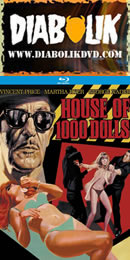
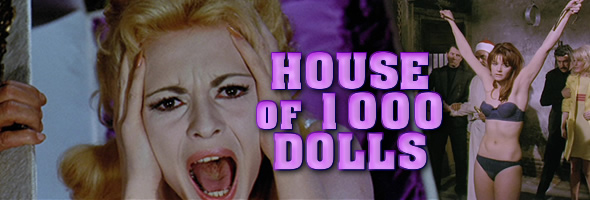
Color, 1967, 96m.
Directed by Jeremy Summers
Starring Vincent Price, Martha Hyer, George Nader, Ann Smyrner, Sancho Gracia, Maria Rohm
Kino Lorber (Blu-ray) (US RA HD), MGM (DVD-R) (US R0 NTSC), Intergroove (Germany R2 PAL), Mediumrare (UK R2 PAL), Umbrella (Australia R0 PAL) / WS (2.35:1) (16:9)
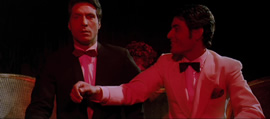
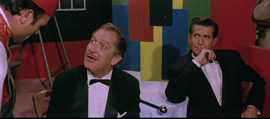 The lurid title and concept for this trashy white smuggling tale should give you some idea of what to expect from what ranked at the time as the most sensationalist film Vincent Price made for American International Pictures. Lensed in Spain, the Spanish/German/U.S. co-production is the closest approximation we have to how a Jess Franco film starring Price might have turned out, given the fact that this was produced by the infamous Harry Allan Towers (who was behind many of Franco's biggest budgeted films around that time) and stars Towers' wife, Maria Rohm, who had just appeared in The Vengeance of Fu Manchu for this film's director, Jeremy Summers, and was about to embark on nine collaborations with Franco.
The lurid title and concept for this trashy white smuggling tale should give you some idea of what to expect from what ranked at the time as the most sensationalist film Vincent Price made for American International Pictures. Lensed in Spain, the Spanish/German/U.S. co-production is the closest approximation we have to how a Jess Franco film starring Price might have turned out, given the fact that this was produced by the infamous Harry Allan Towers (who was behind many of Franco's biggest budgeted films around that time) and stars Towers' wife, Maria Rohm, who had just appeared in The Vengeance of Fu Manchu for this film's director, Jeremy Summers, and was about to embark on nine collaborations with Franco.
Things start out with a bang as Price is seen as well-dressed magician Felix Manderville overseeing the delivery of an ornate coffin into his palatial home, only for a screaming Diane (Rohm) to burst out of the casket. As it turns out, Felix and his wife, Rebecca (Hyer, fresh off of Picture Mommy Dead), use their popular nightclub magic act as a front for their female kidnapping and prostitution ring, with women unwittingly hypnotized and delivered into their clutches. 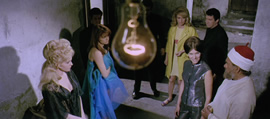 The Tangiers club circuit also provides plenty of prospects with pretty dancers and performers around, and into this environment stumble Stephen and Maggie Armstrong (Nader and Smyrner), who decide to help Diane's distraught boyfriend (Gracia) track her down. Their biggest clue is the shadowy King of Hearts, the ringleader behind the sleazy brothel where women are trussed up and forced to do unspeakable (off camera) deeds.
The Tangiers club circuit also provides plenty of prospects with pretty dancers and performers around, and into this environment stumble Stephen and Maggie Armstrong (Nader and Smyrner), who decide to help Diane's distraught boyfriend (Gracia) track her down. Their biggest clue is the shadowy King of Hearts, the ringleader behind the sleazy brothel where women are trussed up and forced to do unspeakable (off camera) deeds. 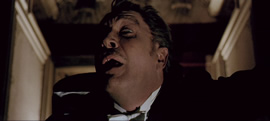
It's safe to say that this film would have been a lot more graphic had it been made two years later, but what we have here is an oddly charming chunk of pulp entertainment with scantily clad women darting around the scope frame every few minutes and the always wonderful Price offering another one of his suave villainous turns. The whole thing is colorful and slickly mounted with a sort of continental decadence you never see in films anymore, and Price even implied in interviews that there was a saucier version of the film being shot behind the actors' backs at night (a tactic indisputably employed ten years later on Caligula). That turned out to be mostly hyperbole as AIP's drastically cut 79-minute theatrical version (issued by Orion on VHS) was later supplanted on home video by the 96-minute European cut, which is indeed longer but not particularly graphic unless you're shocked by restraints and lingerie. On the other hand this may be the first mainstream film to 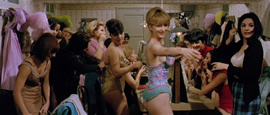 contain a female mud wrestling scene, which is worth a few exploitation points by itself.
contain a female mud wrestling scene, which is worth a few exploitation points by itself.
The uncut version of House of 1000 Dolls debuted on American home video courtesy of MGM's on-demand DVD-R program with an okay but fairly drab 16x9 presentation that at least retains the original scope aspect ratio, with the same master used for British and Australian DVD releases. The 2015 Blu-ray from Kino Lorber is a tremendous upgrade 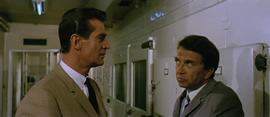 across the board as it features an infinitely more detailed, colorful presentation that adds a classy veneer to visuals that once seemed crude and amateurish. The vibrant hues here are often very impressive, and anyone who's run into this film before will probably be rubbing their eyes at how good it looks here. The original English audio sounds fine in the DTS-MA mono version found here, and while a good version of the trailer has yet to turn up, you do get bonus trailers for Madhouse, Tales of Terror, and More Dead Than Alive. More substantially, the big extra here is a new audio commentary by regular Price commentator David Del Valle and director David DeCoteau, who talk about the pertinent production facts (such as the early idea to present this as a Sax Rohmer tale) and get pretty dishy as they leave you with the impression that almost every single person involved with the film was either gay or had some sordid secret to hide. Of course the most famous example is Nader, a leading man outed as a sacrifice to the tabloids instead of Rock Hudson who was in the midst of playing Jerry Cotten in the popular German spy series when he made this film. Of course, he also went on to pen the breakthrough 1978 sci-fi gay novel Chrome, which would make for a pretty crazy film someday if anyone had to nerve to tackle it.
across the board as it features an infinitely more detailed, colorful presentation that adds a classy veneer to visuals that once seemed crude and amateurish. The vibrant hues here are often very impressive, and anyone who's run into this film before will probably be rubbing their eyes at how good it looks here. The original English audio sounds fine in the DTS-MA mono version found here, and while a good version of the trailer has yet to turn up, you do get bonus trailers for Madhouse, Tales of Terror, and More Dead Than Alive. More substantially, the big extra here is a new audio commentary by regular Price commentator David Del Valle and director David DeCoteau, who talk about the pertinent production facts (such as the early idea to present this as a Sax Rohmer tale) and get pretty dishy as they leave you with the impression that almost every single person involved with the film was either gay or had some sordid secret to hide. Of course the most famous example is Nader, a leading man outed as a sacrifice to the tabloids instead of Rock Hudson who was in the midst of playing Jerry Cotten in the popular German spy series when he made this film. Of course, he also went on to pen the breakthrough 1978 sci-fi gay novel Chrome, which would make for a pretty crazy film someday if anyone had to nerve to tackle it.
Reviewed on July 16, 2015.








